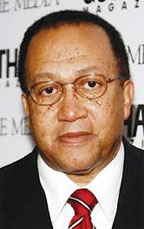
Empowering Black America
By Benjamin F. Chavis, Jr. NNPA Columnist
Every March the National Newspaper Publishers Association (NNPA) and its philanthropic arm, the NNPA Foundation, gather in Washington, D.C. for Black Press Week. I attended this year’s Black Press Week with a heightened interest in how ur Black-owned newspapers, together with the Black Church and our Historically Black Colleges and Universities (HBCUs) across America can all work together to plan, execute and sustain the economic, social, political, cultural and spiritual empowerment of our families, businesses and communities in every state.
It is indeed a pleasure to share with you that we witnessed a profound sharing of insights, knowledge and experiences from a diverse collective of NNPA publishers, business leaders, academic researchers, theologians, and from a noted group of family, youth and community leaders. It was an intergeneration conference of experts who exchanged perspectives on not just the systemic problems that beset the majority of more than 45 million Black Americans, but also and more importantly on the “participatory” solutions to our problems. Throughout many of the workshops and panel discussions, a common theme emerged: “We all should work strategically together to empower our people in every facet of business, education, technology, media and human endeavor.”
Empowerment may be defined as the process of enabling the attainment of sustainable power. Power is the ability, authority and capacity to do and act in one’s interest unrestrained by external factors, fears, threats or intimidations. Power is not just a mathematical formula involving time and distance, power is also an economic and political reality and condition that impacts the quality of life of humanity.
Black Americans have an annual combined spending or consumer power of more than $1 trillion. We have to express our gratitude to the NNPA and the Nielsen Company for their excellent research that documents the spending patterns of Black Americans. Yet, too many of our businesses are facing severe financial difficulties. The housing foreclosure rate in our communities continues to be the highest rate even amidst a gradual economic recovery of the U.S. housing market. Too many of our HBCUs are experiencing funding and resource development challenges.
The Centers for Disease Control and Prevention (CDC) just released another national study that shows that we have the highest rate of HIV infections in the nation. The CDC reported, “Blacks make up only 12 percent of the U.S. population but had nearly half (44 percent) of all new HIV infections in the United States.” But there was also some news: “Despite these numbers, there are encouraging signs of progress against HIV in the Black community. Blacks are more likely than other races and ethnicities to report that they have been tested for HIV at least once – 65 percent versus 46 percent for Hispanics/Latinos and 41 percent for whites. And the number of new HIV infections among blacks overall is on target to meet a 2015 national goal to reduce new infections by 25 percent. As well, Black women had a 21 percent decline in new infections. But more work needs to be done to make sure everyone knows how to protect themselves and their partners against HIV.”
The issue of how to effectively respond to the issue of HIV/AIDS was addressed by The Black Pulpit and Black Press panel discussion moderated by Rev. Walter Silva Thompson Jr., pastor of Morning Star Missionary Baptist Church, Jamaica, N.Y.
Panelists were: Rev. Kendrick E. Curry, Senior Pastor, Pennsylvania Avenue Baptist Church, in Washington, DC; Rev. Lewis Brogdon, director, Black Church Studies Program at Louisville Seminary; Rev. Yvonne Cooper, Associate Minister, Allen Chapel AME Church, Washington; and Pastor Frances “Toni” Draper, Freedom Temple AME Zion Church, Baltimore, Md. We agreed that the Black Church and the Black Press must collaborate more closely.
Another critical area of focus was to empower our families and communities to end the senseless gun violence that is destroying the lives of our young people. One of the highlights of Black Press Week was presenting the NNPA “Newsmakers of the Year” awards to Ron Davis and Lucy McBath, parents of slain Florida teen Jordan Davis; and to Cleopatra and Nathaniel Pendleton, parents of slain Chicago teen Hadiya Pendelton. Being in the presence of these parents who have lost their children to gun violence served a real-time imperative that challenged all of us to do more on this critical issue.
We also went to a special White House briefing on President Barack Obama’s new initiative on “Creating and Expanding Opportunity for Boys and Young Men of Color” titled “My Brother’s Keeper.” .
Black Press Week concluded at the National Press Club with an outstanding luncheon panel discussion led by our NNPA News Service Editor-in-Chief George E. Curry. The topic was “Access to Economic Opportunity” and the panel members were Maggie Anderson, co-author of Our Black Year; Bill Spriggs, chairman of Department of Economics at Howard University and. Valerie Ralston Wilson, director of the Program on Race, Ethnicity, and the Economy, Economic Policy Institute.
I was again inspired by the renewed call for a national grass roots activism campaign to regain control of the dollars that flow in and quickly out of our community.


Be the first to comment